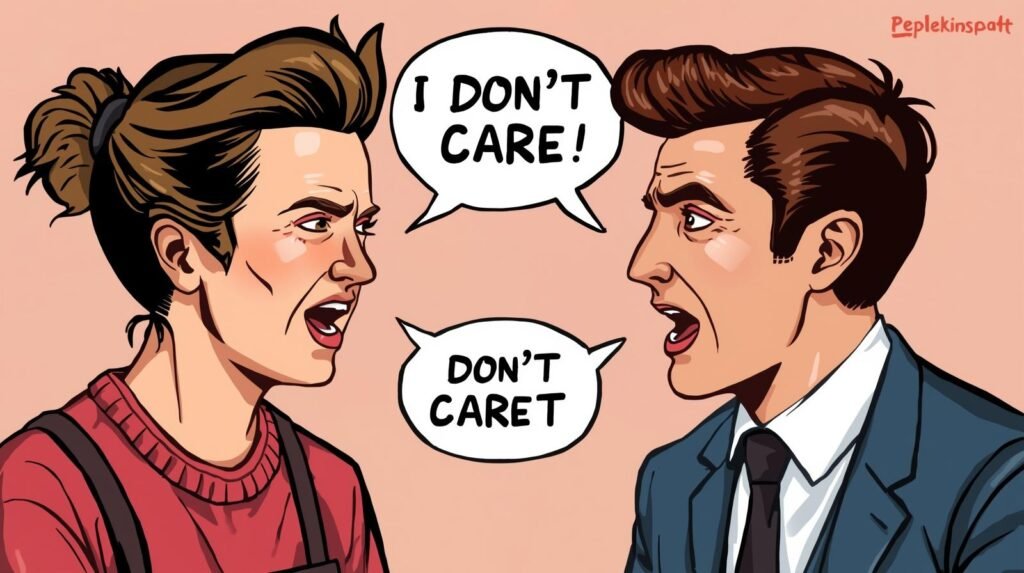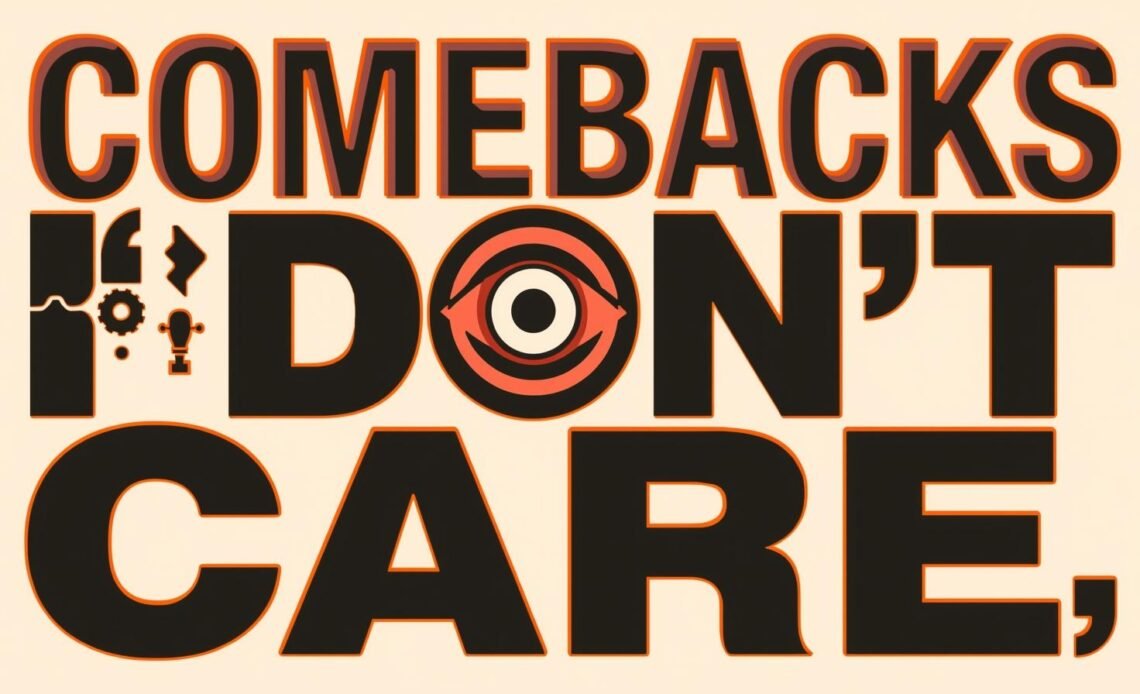Hearing someone say “I don’t care” can sting, leaving you unsure how to respond without seeming harsh or dismissive. Whether in casual chats, professional interactions, or personal relationships, knowing the right comeback can help you express your feelings while maintaining your confidence and composure. Comebacks for “I Don’t Care” allow you to turn awkward moments into opportunities for humor, reflection, or connection. From playful and witty replies to empathetic and heartfelt answers, this guide provides 150 of the best lines categorized for easy use. No matter the context, you’ll find a perfect response to stand your ground, spark a conversation, or lighten the mood.
Powerful Comebacks for “I Don’t Care”
Thoughtful/Empathetic Responses
- I understand you might feel indifferent, but sharing your thoughts will help me feel heard and make this discussion meaningful for both of us.
- I get it—maybe this topic isn’t important to you—but your perspective still matters to me in understanding things clearly and fairly.
- It seems like this issue isn’t resonating with you, yet I hope you’ll consider that your input could truly make a difference.
- I hear that you don’t care, and that’s fine, but I’d really appreciate any insights you might share for clarity here.
- Your lack of interest is noticed, but I still value your thoughts and would love to understand your perspective in this conversation.
- It’s okay to feel detached, yet I hope we can find some common ground that makes this discussion more constructive and meaningful.
- I know this might not matter to you, but it matters to me, so I’d really appreciate your insight on this.
- I understand you’re indifferent, but hearing even a small opinion from you could help me navigate this situation more effectively and fairly.
- You may not care right now, but contributing even a little could make this conversation feel more collaborative, productive, and fair for both.
- I respect how you feel and still hope you’ll engage enough to share your perspective so we can understand each other better.
Read More: Flirty Replies to Compliments From Guys.
Humorous/Playful Comebacks
- Oh, you don’t care? Great, I’ll just assume your expertise lies in mastering the extraordinary art of zero interest.
- That’s fine, I’ll gladly take responsibility for all the caring here and manage everything for both of us.
- Perfect, one less opinion to argue with means I can finally take the center stage confidently today.
- Don’t worry, I’ve prepared a grand medal for your remarkable achievement in giving absolutely zero cares today, congratulations.
- No problem, I’ll just save all the excitement and enthusiasm for someone who actually seems to genuinely care.
- Oh, you don’t care? Excellent! I’ve been practicing dramatic monologues specifically for humorous situations like this moment.
- Cool, I’ll just pretend your complete indifference is applause and keep going with energy anyway, without hesitation.
- Sweet! I’ve always wanted to talk to a professional non-caring enthusiast—it’s truly my long-awaited dream come true.
- Fantastic! Your “don’t care” attitude is so inspiring; now I can overthink everything completely on my own.
- Ah, relief! I was honestly worried about sharing my feelings with someone who might actually, surprisingly care.
Sarcastic/Ironic Comebacks
- Wow, thanks for letting me know—your opinion is clearly the ultimate benchmark of importance in every conversation today.
- Of course, the world could never continue functioning properly without your profoundly invaluable care and dedication to everything.
- Oh yes, please teach me exactly how your total disinterest has somehow become crucial to our collective success.
- I’m relieved to hear that your remarkable apathy has officially been filed and archived for future reference permanently.
- Fantastic, I’ll just wait patiently for approval from the undisputed master of perfectly not caring, apparently.
- Thanks, I almost forgot that nothing truly matters unless it somehow receives your attention, approval, and blessing first.
- Incredible! I’ll mark today as the official anniversary of your grand declaration of indifference—it’s historic, obviously.
- Oh, absolutely, your care—or complete lack thereof—is precisely what I was waiting for to finally proceed today.
- Amazing, your nonchalance is so inspiring I’ll strive endlessly to emulate your exact zero-interest, indifferent energy perfectly.
- Right, because your personal level of caring is obviously the single most vital ingredient for the universe today.
Witty/Sharp Comebacks
- Care level: zero, but enthusiasm level: maximum—I’ve got this covered completely, no matter what your indifferent input says.
- Oh, I see you’re practicing selective attention; that’s an impressively sharp skill, deserving recognition, congratulations for your focus.
- I’ll manage to care sufficiently for both of us and still leave plenty of room for clever wit.
- Care not required, but sarcasm is definitely appreciated—thanks for providing inspiration for my next witty, playful remark.
- Interesting, your complete indifference gives me ample room to shine confidently without facing any kind of competition today.
- Don’t worry, I’ve got enough style points to survive your zero-care commentary and still look effortlessly impressive.
- Your nonchalance is duly noted, but my cleverness remains fully unaffected by your lack of attention or care.
- Excellent, that gives me full freedom to craft a perfectly timed, flawless response without any interruptions whatsoever.
- Your lack of care is the perfect setup for my next witty, sharp, and brilliantly playful comeback line.
- I appreciate your total indifference—it fuels my sharpest, most playful lines, giving me all the room to shine.
Bold/Confident/Baddie Comebacks
- I’ll keep thriving and achieving, even if your opinion is irrelevant and your loud indifference is completely clear today.
- Oh, I see your lack of care—don’t worry, it won’t stop me from being completely extraordinary here.
- Your “don’t care” attitude just lost its VIP status in my life—carry on, I’ll keep excelling regardless.
- Too bad, your complete indifference is irrelevant, but my confidence and determination aren’t going anywhere anytime soon.
- I’ll shine bright and boldly, even without your attention or approval—thanks for noticing, though I wasn’t waiting.
- Your opinion isn’t the trend I follow—my independent path and unapologetic style remain entirely mine to choose.
- Not caring is so last season; I’m moving forward confidently with style, strength, and unmatched boldness always.
- Guess I’ll keep succeeding, thriving, and advancing while your apathetic gaze watches silently from the sidelines in awe.
- I’m completely unfazed by your indifference because my self-worth and accomplishments are never dependent on anyone else.
- Your “I don’t care” doesn’t affect my radiant glow or confidence—I continue thriving regardless of your attitude.
Straightforward/Direct Comebacks

- Okay, noted. I understand this isn’t important to you, but it still genuinely matters a great deal to me.
- Understood, I’ll move forward without needing your involvement or opinion, as this matter requires attention regardless of your indifference.
- Got it, your indifference is apparent, so I’ll manage everything independently without requiring your guidance or input at all.
- Fair enough, I’ll make all necessary decisions without waiting for your approval, participation, or any contribution whatsoever today.
- Alright then, I’ll handle what needs doing while you remain completely uninvolved and free to focus on yourself.
- Thanks for your honesty; I’ll continue without expecting your interest, attention, or care regarding matters important to me.
- I see, your input isn’t needed, so I’ll proceed as planned without consulting or relying on your participation.
- Okay, we’ll leave it there; I’ll carry on and address everything that requires attention without waiting for your input.
- Noted, I’ll respect your choice to remain detached while I take responsibility and handle matters requiring my focus.
- Alright, understood. I’ll take charge and continue forward without needing your engagement, involvement, or approval at any point.
Defensive/Boundary-Setting Comebacks
- I care about this issue, and I won’t keep engaging if you remain completely uninterested in listening or responding.
- Your indifference is clear, but my feelings, efforts, and perspective deserve acknowledgment, respect, and thoughtful consideration from you.
- I understand you don’t care, yet I won’t compromise my peace, focus, or emotional wellbeing for your apathy.
- I’m sharing this because it genuinely matters to me, not for your approval, validation, or passive attention.
- Your lack of care doesn’t give you permission to dismiss, ignore, or undermine my thoughts and perspectives entirely.
- I respect your choice to stay detached, but I still need space and freedom to voice my perspective fully.
- It’s fine if you don’t care, but I won’t overlook, ignore, or abandon what truly matters to me.
- I’ll step back if your apathy prevents meaningful discussion, constructive dialogue, or mutual respect from taking place here.
- I’m here to communicate openly, not to coerce engagement from someone unwilling to participate or contribute meaningfully.
- Your indifference is your choice; I choose to protect my energy, focus, and emotional wellbeing in response.
Curious/Inquisitive Comebacks
- I’m genuinely curious—why does this issue or situation not seem to matter to you in any way at all?
- Can you help me understand why you’re feeling so indifferent and detached toward this matter right now?
- I wonder what factors make you choose not to care or invest any energy into this situation.
- Is there a reason why this topic doesn’t resonate with you? I’d really appreciate your honest insight.
- What about this situation makes it challenging for you to feel any genuine interest or investment?
- Can you explain why this doesn’t hold your attention or interest, so I can better understand your perspective?
- I’d like to know why you appear detached from something that seems meaningful or important to me.
- Is there something deeper or underlying that’s causing you not to care about this situation right now?
- Why do you feel indifferent toward this matter? Understanding your perspective could help us communicate more effectively.
- What would need to happen for this situation to matter to you, even a little, if at all?
Compassionate/Heartfelt Comebacks for Loved Ones
- I know you might not feel like talking now, but I’m here whenever you’re ready to share openly.
- It seems like you’re distant right now—would you like to talk with me about what’s truly bothering you?
- I understand you’re checked out emotionally, but your feelings still matter deeply and genuinely to me right now.
- I see your indifference, and I just want to ensure you’re emotionally okay, safe, and supported always.
- It’s unusual for you to seem so detached—maybe we could explore together what’s really going on inside.
- I know life can feel overwhelming, but I’m here to support, listen, and help you through it.
- I genuinely care about how you’re feeling, even if it seems like you don’t care right now.
- I want to connect with you, not pressure—please let me know whenever you’re ready to talk.
- You might feel numb now, but I still deeply value you, your wellbeing, and our relationship always.
- I’m concerned about your disinterest and truly just want to make sure you’re okay emotionally and mentally.
Peacekeeping/Non-Confrontational Comebacks
- It’s fine, let’s drop this topic and redirect our energy toward something we both enjoy, keeping the mood light and friendly.
- Okay, no worries—I’m not here to argue, just sharing my thoughts calmly so we can move forward respectfully together.
- Totally fine, we can move on from this and avoid unnecessary tension while keeping our conversation positive and productive for both.
- I respect your viewpoint—let’s keep this discussion low-pressure, focusing on understanding rather than conflict, so we maintain harmony between us.
- Alright, let’s leave this here for now and revisit later if needed, giving each of us space to reflect and cool down.
- Fair enough, let’s focus on practical solutions instead of dwelling on disagreements, aiming to preserve a calm, cooperative atmosphere for both.
- No problem, we don’t need to dwell on it; we can move forward calmly and keep things constructive between us.
- That’s okay, we can redirect our energy toward more productive topics that encourage collaboration and avoid unnecessary arguments or stress.
- I hear you, so let’s avoid escalating tension and instead focus on finding common ground to maintain mutual respect and peace.
- Cool, let’s skip unnecessary conflict and proceed with understanding, ensuring our conversation remains respectful, calm, and beneficial for both sides.
Indifferent/Detached/Cold Comebacks
- Same here, your opinion doesn’t change my actions or feelings; I’ll continue focusing on what truly matters to me.
- Noted, it doesn’t bother me at all that you remain indifferent or detached from this particular situation today.
- Alright, moving on—your detachment won’t affect the outcome or the way I manage what needs attention here.
- Okay, it is what it is, and I’ll continue handling matters as required without letting indifference interfere.
- Doesn’t matter to me either; I’ll proceed independently without seeking or needing your input on this issue.
- Fine, I’m indifferent as well, so let’s keep moving forward without letting your apathy escalate into conflict.
- Understood, your lack of care doesn’t influence my priorities, choices, or how I plan to handle this.
- Right, I’ll continue without factoring in your indifference—it changes nothing about my decisions or how I proceed.
- Sure, carry on with your detachment while I responsibly focus on what needs to be done today.
- Not an issue, I’ll maintain my focus and handle everything necessary, regardless of your lack of concern.
Reflective/Philosophical Comebacks

- Sometimes when someone says “I don’t care,” it’s a sign they feel overwhelmed, not that they truly lack interest or concern.
- It’s interesting how indifference often serves as a protective shield against vulnerability, disappointment, or uncomfortable emotional exposure in daily interactions.
- Perhaps their lack of care reflects a temporary disconnect or emotional fatigue rather than a permanent state of apathy or disregard.
- Often, saying “I don’t care” conceals deeper feelings someone isn’t yet ready to express openly or confront with others.
- Indifference can act as a defense mechanism, and understanding it requires patience, empathy, and attentive listening to subtle emotional cues.
- I notice that levels of care fluctuate naturally—feeling detached or indifferent at times is a normal part of being human.
- Our reactions to others’ indifference often reveal as much about our perspective and patience as about the situation itself.
- Sometimes not showing care is easier than addressing uncomfortable truths or confronting emotions that are difficult to process effectively.
- Indifference should be seen as a signal rather than a statement of fact—it encourages reflection and deeper understanding.
- Recognizing the emotional walls behind “I don’t care” can help guide more compassionate, thoughtful, and supportive responses in any conversation.
Motivational/Encouraging Comebacks
- You’ll care more once you see how impactful this decision could be for your growth and future success.
- This truly matters, and your engagement can create far better outcomes than remaining indifferent or uninvolved at all.
- Caring now may prevent challenges later—investing effort today is often the key to meaningful rewards and results.
- Even a little interest today can make a tremendous difference in achieving your goals efficiently and effectively.
- When you invest energy in this task, the results will surprise you and prove the effort worthwhile.
- Your attention matters; taking small, consistent steps now can lead to significant, positive, and lasting change.
- Being involved today ensures fewer regrets tomorrow—never underestimate the transformative power of active caring and effort.
- Imagine the benefits if you cared a little more; you might be pleasantly surprised by the results.
- Engaging even slightly now will produce meaningful results that make your future self proud and fulfilled.
- Caring is always a choice that directly influences outcomes—your participation has the power to transform situations positively.
Situational/Context-Based Comebacks
- In casual chats, saying “Okay, your call!” works perfectly when stakes are low and humor fits the moment.
- At work, a professional reply like “Noted, I’ll handle this task” keeps things clear without creating unnecessary conflict.
- With friends, playful lines such as “Oh, I know you secretly care a bit!” lighten the mood instantly.
- In romantic contexts, heartfelt responses like “I care about your feelings; can we talk openly about this together?” are ideal.
- When someone is overwhelmed, saying “I see you’re checked out—how can I help you feel supported right now?” works best.
- For siblings, teasing lines like “Guess I’ll keep this secret to myself then” spark engagement and shared laughter effectively.
- With students or children, motivational replies such as “You’ll be glad you cared later when results start showing improvements clearly” guide learning.
- In professional disagreements, non-confrontational replies like “Let’s revisit this later calmly with fresh eyes and perspective” maintain harmony and respect.
- Among peers, witty lines like “Care level: expert mode disabled, enthusiasm level: maximum” entertain without offending anyone present.
- For sensitive situations, compassionate approaches like “It’s okay to feel disconnected; I’m here for you whenever you’re ready to talk” foster understanding.
Read More: Great Roasts To Say To A Bully.
When to Go Beyond Comebacks
- Recurring indifference in close relationships may indicate deeper issues needing honest conversation.
- If someone seems overwhelmed, offer support rather than push for engagement—empathy is key.
- In professional settings, avoid conflict and focus on collaboration for effective outcomes.
- Protect your emotional energy when repeated apathy affects your peace or productivity.
- Recognize when “I don’t care” signals burnout, stress, or disengagement that needs attention.
- Sometimes silence or space is more powerful than any witty comeback or argument.
- A red flag of recurring detachment may warrant a heart-to-heart discussion.
- Approach with compassion when loved ones’ indifference seems unusual or out of character.
- Set boundaries and assert needs without escalating tension in ongoing conflicts.
- Use these moments to reflect on relationships and prioritize communication over winning arguments.
Conclusion
Having a wide range of Comebacks for “I Don’t Care” empowers you to handle indifference gracefully, confidently, and even humorously. Whether you choose playful, witty, compassionate, or bold responses, the key is matching your reply to the context and relationship. These 150 lines, organized into 15 categories, provide versatile tools for casual chats, professional situations, and heartfelt conversations. With the right approach, “I don’t care” can become an opportunity to engage meaningfully, maintain self-respect, and even spark connection, humor, or reflection in any situation.


